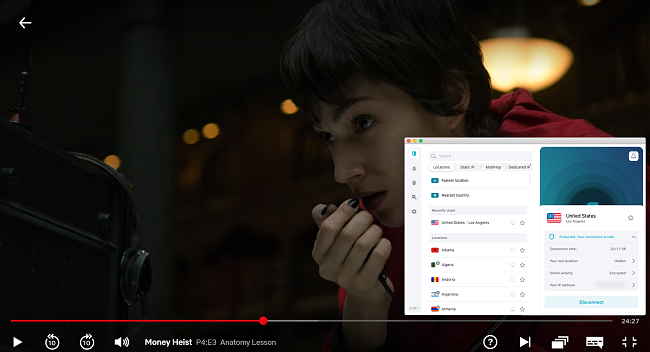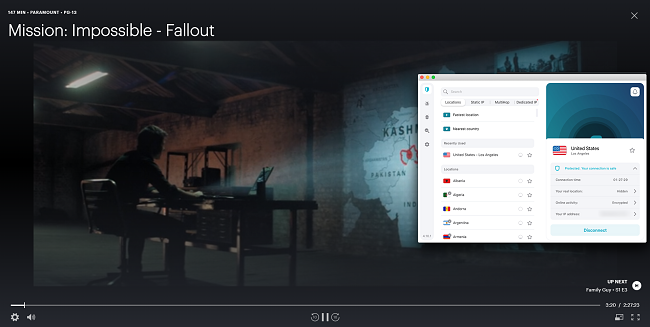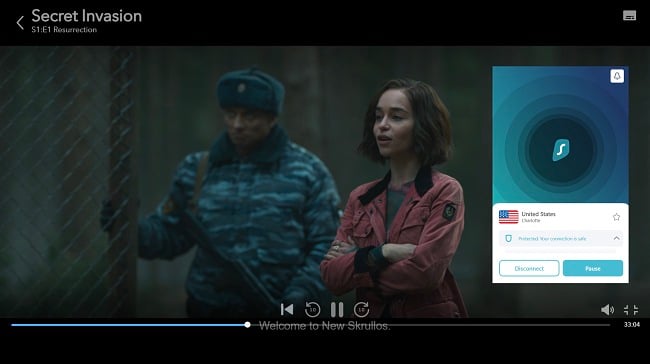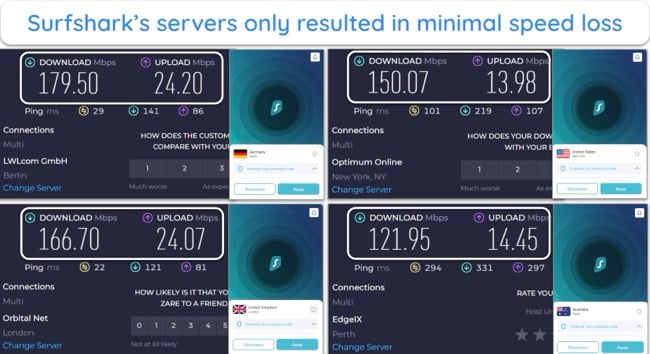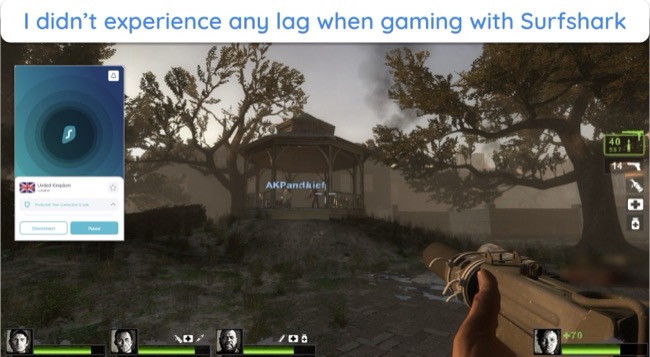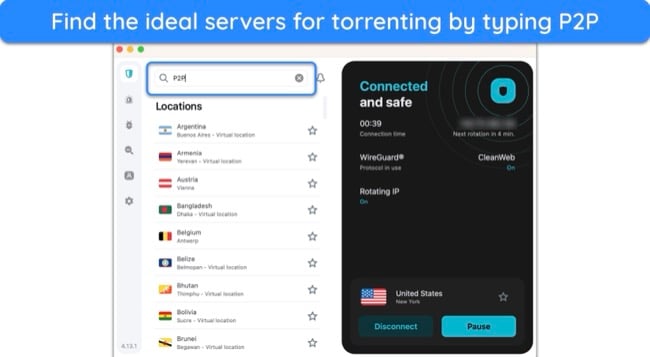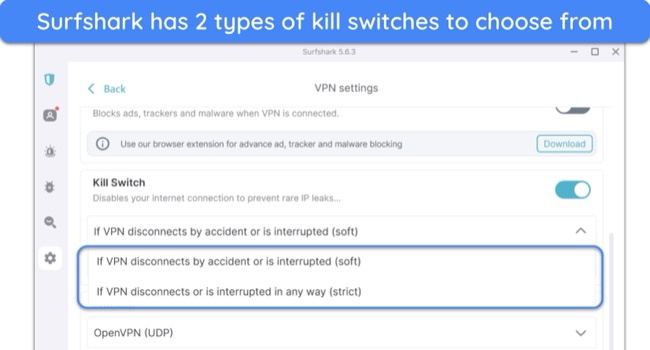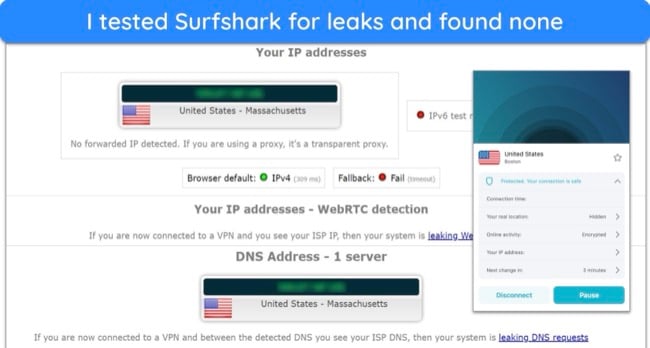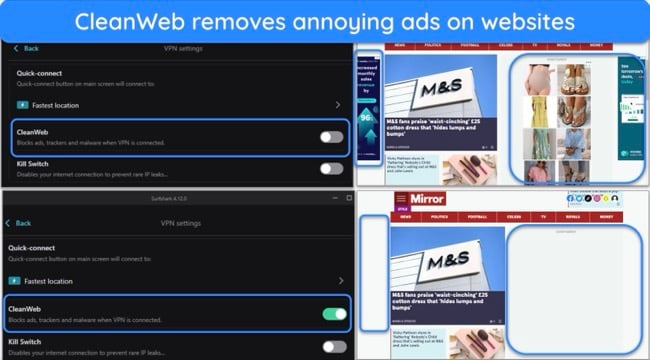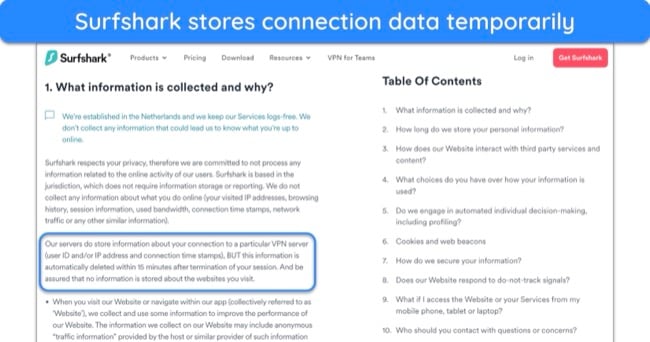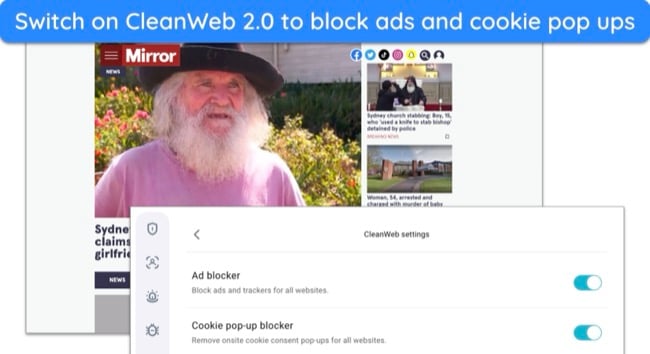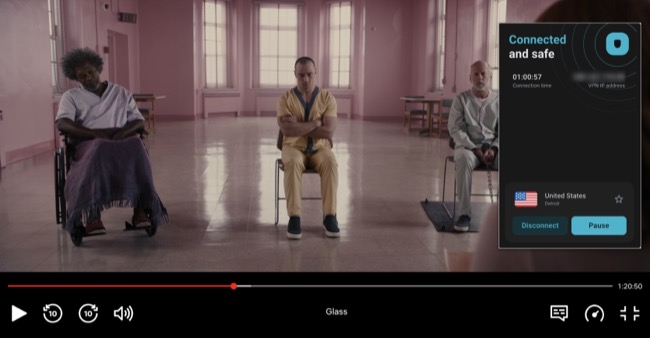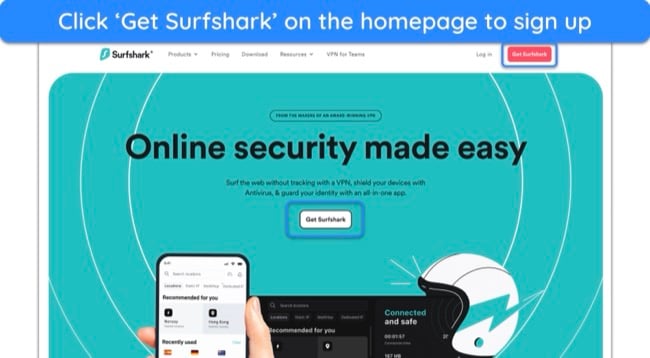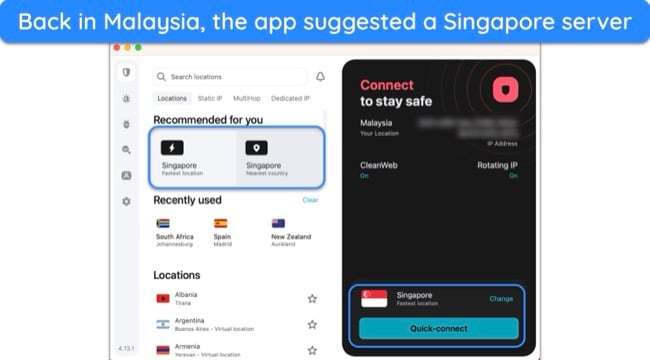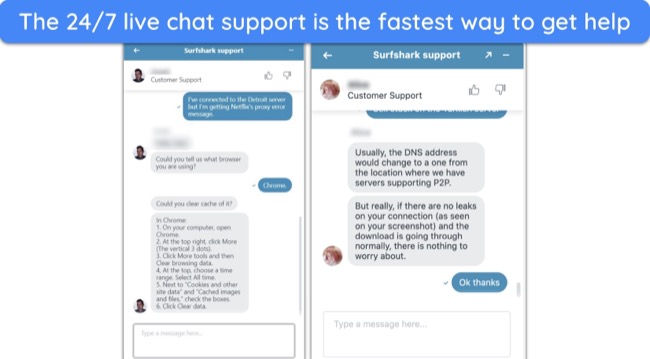Today's special deal
Save 86%
 Speed
Speed
|
9.0 / 10 |
|---|---|
 Servers
Servers
|
10.0 / 10 |
 User Experience
User Experience
|
8.0 / 10 |
 Support
Support
|
10.0 / 10 |
 Pricing
Pricing
|
10.0 / 10 |
Surfshark is a popular VPN, and rightly so. It has many advanced features, a huge network, and high-speed servers. Its Nexus technology is constantly being improved to solve common connectivity issues. I’m impressed by Surfshark’s functionality, considering how little it costs for its 2-year + 3 months plan.
But no VPN is perfect, and Surfshark users have often complained about how long it takes to connect to a server. Some Redditors say its virtual servers cause IP leaks, while others are frustrated by the CAPTCHA verification Surfshark triggers. To find out if these claims were true, I tested Surfshark over several weeks in every single category.
My results show that Surfshark is a fantastic VPN for its price. However, it may not be suitable for everyone, and Surfshark can be expensive in the long run on its monthly plan. Before you subscribe, read this review to find out how Surfshark performed during tests and if it’s for you.
Browse privately with Surfshark
Get Surfshark for online safety
Surfshark works with all major streaming services. Besides Netflix, Amazon Prime Video, and Hulu, Surfshark worked with 25 other platforms during tests, including:
| Disney+ | Max | NBC Sports | Yle | Abema TV |
| BBC iPlayer | ITVx | All 4 | Sky Go | UKTV |
| Apple TV | ESPN+ | Paramount+ | Peacock TV | Kodi |
| Youtube TV | fuboTV | Crunchyroll | Vudu | Discovery+ |
| France TV | DAZN | Sling TV | RTÉ Player | Rai Play |
Unfortunately, not every server successfully connected on the first attempt. Sometimes, it took at least 2 tries with different servers before establishing a working connection. If you don’t want to go through this hassle, CyberGhost has a streaming-optimized network for major services — the team tests servers regularly to make sure the connections work.
Surfshark is one of the top VPNs for watching Netflix US and at least 10 other libraries around the world. When tested, it could access libraries in the following countries:
| UK | Canada | Australia | Japan | France |
| Germany | India | Italy | Mexico | The Netherlands |
The average connection speed with Surfshark was fast enough to stream shows in UHD without lag or buffering — even over distant servers. The connection also remained steady throughout entire movies and episodes. Only 1 tester reported being interrupted by 5 seconds of buffering when a movie had just started.
Surfshark worked with Amazon Prime Video in most locations, including the US and UK. Some reliable server locations are Boston, Charlotte, and New York in the US, as well as London and Manchester in the UK. Unlike Netflix, it didn’t take several tries to log into Amazon Prime Video with Surfshark.
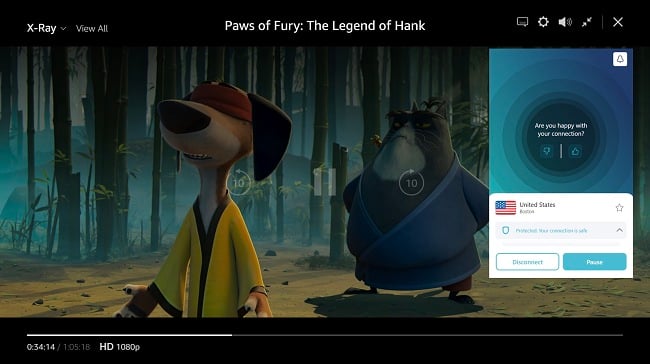
Surfshark easily connected to Hulu on over 10 US servers, with the fastest being those in Boston, Detroit, and Manassas. It only took a few seconds to load the movie Mission: Impossible – Fallout watch the entire film in UHD with zero buffering.
My teammates in the US, Netherlands, and India had no problems watching Disney+ with Surfshark. Episodes of Secret Invasion loaded in just a few seconds and played in UHD without buffering.
Unfortunately, it didn’t work with Disney+ in other countries, and connections were redirected to the US library instead.
Surfshark also made it possible to watch Max (formerly HBO Max) on every US server. 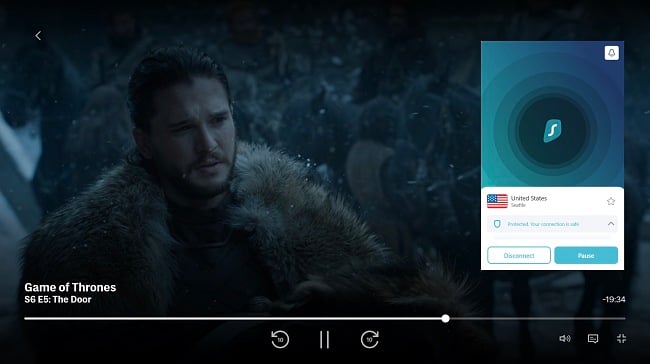
The videos loaded quickly, and there were no connection errors throughout several episodes of Game of Thrones. The servers in Boston, Dallas, Manassas, Miami, New York, and Tampa had the best streaming quality.
I ran several speed tests on Surfshark’s servers in Berlin, London, New York, and Perth from the Netherlands on my Windows laptop, with a baseline speed of 197.26 Mbps. My Ookla SpeedTest results showed that Surfshark doesn’t drop speeds too much.
Every Surfshark server I tested supported high-bandwidth activities like streaming and torrenting large files. Even its distant servers were faster than many other VPNs I’ve tested and stayed well beyond the minimum of 25Mbps required for UHD streaming. If you’re looking for even better speeds, ExpressVPN is the fastest VPN I’ve tested and recommend.
I first selected the ‘Fastest server’ and ‘Nearest country’ options, both of which connected me to a Surfshark server in Germany. The speed dropped a mere 9%, so I could torrent, game, and watch UHD videos without experiencing any lag.
I found Surfshark’s server in Australia to be the slowest, but this was understandable since it’s a long way from the Netherlands and my data had to travel further. However, the speed drop was negligible on nearby servers in Germany and the UK. I also had the fastest speeds when I used the WireGuard protocol.
However, you shouldn’t expect fast connections with Surfshark’s Dynamic MultiHop servers, as they decreased my speeds by almost 50%. This was unsurprising since my traffic was routed to 2 different servers and encrypted twice for maximum security.
To test Surfshark’s suitability for gaming, I connected to a London server, launched Left 4 Dead 2 on Steam, and ran a speed test. My ping was 22ms, which is very good for a server 300 miles from my location. These low ping rates helped me keep up with my party during the game. I didn’t even have to lower the game resolution to improve speeds.
Generally, ping under 100ms is acceptable, but I wasn’t so lucky with Surfshark’s distant servers in Australia. With ping nearing almost 300ms, it was impossible to keep up with my party. There are better VPNs for gaming, especially if you play fast-paced games like Warzone. But no VPN will be able to give you low ping on distant servers.
Speed determines how fast content uploads, so if you're torrenting or streaming, you want the speed to be somewhat identical to your regular internet speed. Since a VPN encrypts your data, it usually takes a bit longer to send your data back and forth, which can slow down your connection. However, if your ISP deliberately slows down your connection (also known as throttling) a VPN might increase your internet speed. Testing a VPN is somewhat pointless because new servers pop up and affect speed. Your speed can also differ according to your location, so your speed test might not match ours. Having said that, we tested the speed in numerous locations to provide you with the average.
Surfshark has servers in many countries, compared to a lot of other VPNs. It includes physical and virtual servers, as well as optimized connections for P2P file-sharing.
With a network of this size, you’ll always be able to find a Surfshark server nearby. It’s not the biggest number I’ve seen, but it’s not too small that you’ll frequently run into crowded servers, either.
In some countries like India, Egypt, and Mexico, Surfshark offers virtual servers to provide a local IP address without needing to abide by the countries’ less-than-ideal privacy laws. Many other VPNs remove servers altogether when regional laws change, which threatens their ability to maintain their no-log promises. Surfshark’s virtual servers are available in roughly 40 countries.
There are also free static servers in the US, UK, Netherlands, Japan, Singapore, and Germany, allowing you to use the same IP address every time you connect. Though it helps access sites that are sensitive to IP changes without extra verification, static IPs are shared by other users and can be flagged as belonging to a VPN quite easily.
Alternatively, you can try Surfshark’s dedicated IP addresses for a small fee. These are exclusive IP addresses only you can use — helpful for avoiding CAPTCHAs and VPN blocks since there are no other previous (suspicious) activities by another user.
Surfshark doesn’t impose data or bandwidth limits when downloading files, and it’s compatible with popular torrenting clients like qBittorrent and uTorrent. Plus, it has a kill switch and leak protection that ensures no one can snoop on your activities, even if the VPN connection is lost unexpectedly.
The Surfshark website states that you’ll be automatically connected to a P2P server in a torrent-friendly country once you launch a BitTorrent client. But when I connected to a regular server in Turkey and started torrenting on qBittorrent, I was still on the same server.
Since I’d already begun torrenting and was concerned about my privacy, I contacted customer support over 24/7 live chat. The agent asked me to run tests on IPLeak.net, and I saw my IP address was still in Turkey, but the DNS server had changed to the Netherlands. According to the agent, I’d already been rerouted to a P2P server as the DNS address had changed.
To avoid this confusion, you can connect to a P2P server, but these servers aren’t labeled or listed anywhere. To find them, type ‘P2P’ in the search bar on the Location tab — you’ll see the servers available that allow P2P file sharing, including servers in the US and UK.
Despite the NoBorders mode that it claims to work in restrictive regions, Surfshark didn’t work in China. During testing, my colleagues could only connect to 1 server in Ireland, but it failed after 30 seconds. Even after troubleshooting, my colleagues couldn’t use Surfshark. A customer support agent recommended using the Shadowsocks protocol but that didn’t work either.
If this is crucial for you, I recommend ExpressVPN as it works reliably in China. It comes with a 30*-day money-back guarantee, so you can try it risk-free and get a refund with no questions asked. I don’t condone using a VPN to commit illegal acts, so please understand the local laws and know what’s allowed before connecting in China.
Compared to some of the best VPNs in 2025, Surfshark has many advanced features beyond the standard encryption, IP leak protection, and kill switch.
Surfshark uses the industry-leading encryption algorithm, AES-256, to protect your online data against hackers and online snoops. The military-grade cipher would take billions of years to decrypt with the current computers. It also uses a 2048-bit version of the RSA algorithm to secure data transmissions.
The encryption standard also supports Perfect Forward Secrecy to generate a unique session key and discard it once the session ends. By doing this, your privacy and security remain intact — even if an attacker gains access to the encryption keys, they cannot decrypt your VPN sessions in the past or future.
Surfshark offers WireGuard with all its apps, while IKEv2 is available for iOS, Android, and macOS devices. However, OpenVPN is not available on macOS.
Surfshark has a kill switch on all its apps, but it’s not turned on by default. A kill switch shuts off your internet if your VPN gets disconnected for whatever reason. This makes sure your data isn’t accidentally leaked.
Unlike most VPNs, Surfshark gives you ‘soft’ and ‘strict’ kill switches to handle different network conditions. The strict kill switch only allows internet access when the VPN is connected. The soft version kills internet access if you lose connection by accident or your device is switching between networks.
Although many VPNs have strong encryption, they can accidentally leak your private data to the sites you visit and allow others to spy on you without proper leak protections in place. I tested Surfshark’s built-in leak protection by connecting to random servers in the US, Australia, and Germany, and I found that my actual IP address was always secure.
This is contrary to some users’ claim that Surfshark’s virtual servers expose data. I didn’t find any evidence to support this, as none of its virtual servers in Vietnam, India, Saudi Arabia, Argentina, or The Bahamas leaked during my tests.
Unfortunately, your IPv6 data may potentially leak with Surfshark, as it’s a new IP format that the VPN does not yet support. It’s better to disable IPv6 traffic on your device if your network supports it and you wish to use Surfshark. The good news is that Surfshark didn’t cause any DNS or WebRTC leaks during my tests.
Surfshark’s split tunneling functionality is called Bypasser, and it’s useful for making traffic from specific websites and apps bypass the VPN connection. I could do this on my Windows laptop from the ‘Settings’ panel. Unfortunately, it’s not available for macOS and iOS devices.
Many premium VPNs now offer built-in blockers against ads, malware, and trackers, but not all of them work well. However, CleanWeb blocked all pop-up, video, and banner ads on news sites like the Mirror and even on YouTube TV. Sites and videos also loaded faster as a result.
Although Surfshark claims it doesn’t store data, its privacy policy shows it might do so temporarily. It’s also headquartered in a 9-Eyes Alliance country that shares online intelligence with other member countries.
Going through Surfshark’s privacy policy, I found the opening promising, with the assurance it doesn’t collect or store identifiable data. However, further down, the VPN clarified that some information, like user ID, IP address, and connection timestamps are stored by the servers and deleted within 15 minutes after you terminate your session.
If your main reason for using Surfshark is privacy, this can be worrying, especially if you stay connected for many hours while downloading torrents or binge-watching TV shows. On the other hand, Surfshark uses RAM-based servers that delete all your data and browsing history as soon as they’re rebooted.
Additionally, Surfshark publishes a warrant canary on its website to indicate if the company has received a subpoena for user data from a government or law enforcement authority. While Surfshark stresses that the no-log policy prevents it from saving browsing history, I like knowing whether a security letter, gag order, or government warrant has been issued.
Surfshark was initially headquartered in the much more privacy-friendly British Virgin Islands but has since relocated to the Netherlands. Though it’s a member of the 9 Eyes Alliance, the Netherlands doesn’t have any data retention laws. This means that Surfshark is not obligated to log any data about you, so the no-log policy remains in effect.
Like many VPNs, Surfshark has invested in third-party audits to verify its privacy and security claims. This includes an independent Mobile App Security Assessment. It passed all audits to provide the final confirmation and peace of mind that Surfshark doesn’t log data.
In 2018, Cure53 conducted an independent audit of Firefox and Chrome browser extensions. The German IT security firm also did an infrastructure audit and security assessment on Surfshark’s servers in 2021. Recently, Deloitte audited Surfshark’s no-log policy and validated the claim. I also read the reports and saw no significant security or privacy flaws.
Surfshark allows you to connect all your devices at once, has apps for all major devices, and it’s easy to use. But connecting to a server still takes a while, and some servers result in a lot of CAPTCHA verifications.
Unlike most premium VPNs, Surfshark protects unlimited devices with a single subscription. Others only offer 5 to 10 simultaneous device connections, which isn’t enough if you own many devices.
To test this, I connected to a UK server on a Windows laptop, 2 Windows desktops, an iPhone XS, a Samsung Galaxy smartphone, and 3 iPads. I didn’t have any connection issues or significant slowdowns and only noticed some lag when I connected 12 devices at once. It was impressive because many VPNs slowed down as soon as I added an extra device.
I found that Surfshark is a top choice for many devices as it’s easy to use and intuitive. It has native apps for Windows, Mac, Android, iOS, Linux, Android smart TVs, and Amazon Fire devices. It’s also easy to use Surfshark to set up a VPN connection with your smart TV and other devices that don’t natively support a VPN, like game consoles.
You can install Surfshark’s proxy extensions to Chrome, Edge, and Firefox, which hides your browser traffic and IP address. The extensions include CleanWeb 2.0, which has an ad blocker, a cookie pop-up blocker, a data breach alert, and malware alert features. Other than that, you can also spoof your location with the geo-spoofing feature.
Most other VPN extensions are proxies, so I was glad to get VPN-level encryption with Surfshark’s browser extensions. However, everything you do outside of the browsers is not secure.
I was pleased to find Surfshark’s extensions work with streaming services when other proxy extensions struggle to connect. When tested with Netflix US, the browser extensions had no problem playing Glass.
After a quick download and installation, I just had to connect to a server to browse safely. It oddly always took at least 20 seconds for Surfshark to make a connection after starting my device. Although subsequent connections were slightly faster, it’s an issue I never faced with other VPNs.
I also tested Surfshark for an issue users have highlighted a lot. Some Redditors claim that many of the VPN’s servers have been blacklisted by Google and therefore result in verification requests. During tests, my teammates and I tested over 50 Surfshark servers and occasionally encountered CAPTCHA verification with the servers in Italy and South Africa.
But besides the minor inconvenience of checking a box to pass verification, Surfshark is easy to use. Different types of servers for Static IP, MultiHop connections, and Dedicated IP are clearly labeled and easy to switch between. I could also create my own MultiHop connection combo and save it as a favorite for next time.
I was satisfied with Surfshark’s customer support. You can contact Surfshark over email, an online form, or live chat. The customer support team is available 24 hours a day, 7 days a week. However, if you prefer troubleshooting problems yourself, you can check out the website’s setup guides, tutorials, and FAQs.
I tested all the options to see how effectively the company resolved issues and found that live chat is the best way to receive fast help and detailed explanations. For most questions, however, I didn’t look much further than Surfshark’s website.
During my review, I tested the 24/7 live chat feature multiple times as I experienced minor technical difficulties. For example, a teammate couldn’t stream Netflix while connected to a US–Detroit server, and I struggled to connect to a specialty P2P server when torrenting. I was impressed by the friendly and fast responses.
Conveniently, you can access Surfshark’s live chat directly on the Windows and Android apps. All you have to do is go to ‘Settings’ and then ‘Get Instant Help’ for one-to-one assistance. Unfortunately, this feature isn’t available yet on iOS or Mac.
I also tested Surfshark’s email support by asking about some of its features. For comparison, I also used an email address not connected to my Surfshark account to see if there would be a difference in response time. Fortunately, there wasn’t and I received detailed responses in less than an hour every time.
Though the response times were fast, I recommend contacting Surfshark over 24/7 live chat. It’s much quicker as you can speak to a customer support representative directly, especially when you’re facing an urgent technical issue.
Many VPNs have websites with help sections that are poorly organized that they’re barely usable. Surfshark’s “Help” section on its website is comprehensive and regularly updated. Most of the time, I didn’t need to contact customer service as I could find answers to my questions.
Topics are divided into 4 sections: installation, troubleshooting, account, and general inquiries. You can find step-by-step instructions for installation and troubleshooting, complete with screenshots and even some video tutorials.
We personally test the customer support team of every VPN we review. This means asking technical question through the live chat feature (where applicable) and measuring the response time for email questions. Whether you need to connect to a specific server, change your security protocol, or configure a VPN on your router, finding a VPN with quality customer support should be important to you.
Surfshark is an affordable VPN if it’s your first time, considering what you get for the price. Depending on your needs, Surfshark subscriptions are available for 1 month, 1 year, and 2 years. The longer you subscribe to the service, the bigger the discount you’ll receive. The 2-year + 3 months subscription offers the maximum savings at /month.
Within each plan, there are 3 different tiers — Surfshark Starter, Surfshark One, and Surfshark One+. The difference between them is the number of features included. The basic starter plan includes a VPN connection, ad blockers, and Alternative ID.
One thing to remember is that Surfshark’s prices go up significantly upon renewal, often by over 70%. At its premium renewal rate, there are better services than Surfshark. Surfshark’s short-term plan is also one of the most expensive in the market. If you want a month-to-month subscription, check out these VPNs with the best monthly plans.
You can pay with credit cards (Visa, MasterCard, American Express, and Discover), cryptocurrencies (Bitcoin, Ethereum, and Ripple), Amazon Pay, Google Pay, PayPal, and Sofort. If you want to use Surfshark anonymously, sign up with a throwaway email address and pay with cryptocurrency.
Note: Surfshark doesn’t accept payments through QIWI, so if you’re in Russia, you can still use crypto to pay with a layer of anonymity.
Surfshark offers a 7-day free trial on Android, iOS, and macOS apps. Once you sign up for the trial with the Apple or Google Play store, you can use the same login on your Windows device and use it for free for a week. For me, this isn’t long enough to determine if a VPN is suitable, which is why I recommend using the money-back guarantee instead.
If you’re unsure if Surfshark is suitable for you, try it with its 30-day money-back guarantee, which is available to new subscribers. If you aren’t totally satisfied with Surfshark before the end of this period, simply request a refund via 24/7 live chat or send an email to the customer support team.
I tested the money-back guarantee by signing up for the 1-month plan and requested a full refund via live chat before 30 days was up. The agent asked why I wanted to cancel and offered to troubleshoot. But they approved my request after I explained I didn’t like how long it took to connect to a server. Fortunately, I got my money back in 7 days.
After testing Surfshark, I’ve found that some of the issues highlighted by users are true. Connecting to a server takes a few seconds longer than other VPNs, and I ran into CAPTCHAs more than usual with some Surfshark servers. NoBorders would be more useful if it worked in China, and I was also quite shocked to see how much the price went up upon renewal.
However, most of these issues were minor annoyances as they didn’t stop me from torrenting or browsing the internet safely. Features like CleanWeb, Dynamic MultiHop, IP Rotator, and GPS spoofing made the internet safer, and browsing it a lot more enjoyable. It also worked with most streaming platforms, despite what some Redditors claim.
My conclusion is that Surfshark is great if you want a budget-friendly VPN with tons of added features. But in the long run, Surfshark can be quite expensive. If you decide that you don’t actually need all the extras before your plan is up for renewal, there are better VPNs out there for the same or lower price.
Editor's Note: We value our relationship with our readers, and we strive to earn your trust through transparency and integrity. We are in the same ownership group as some of the industry-leading products reviewed on this site: ExpressVPN, Cyberghost, Private Internet Access, and Intego. However, this does not affect our review process, as we adhere to a strict testing methodology.
WizCase is reader-supported so we may receive a commission when you buy through links on our site. You do not pay extra for anything you buy on our site — our commission comes directly from the product owner. Some providers are owned by our parent company. .
